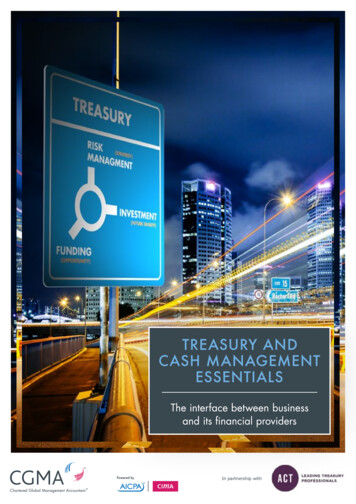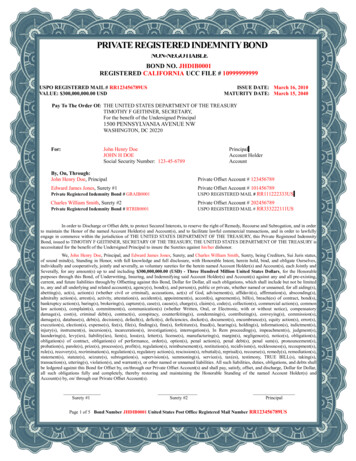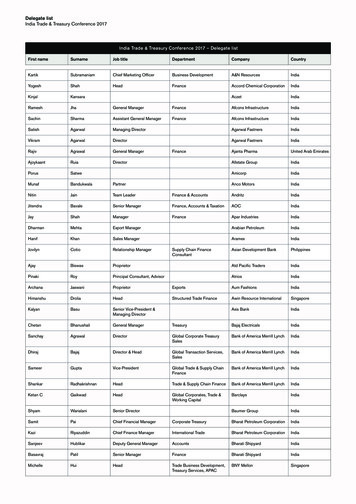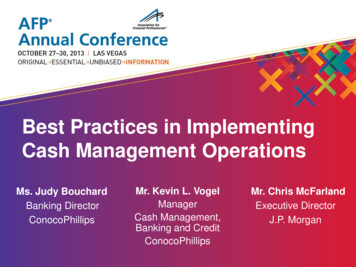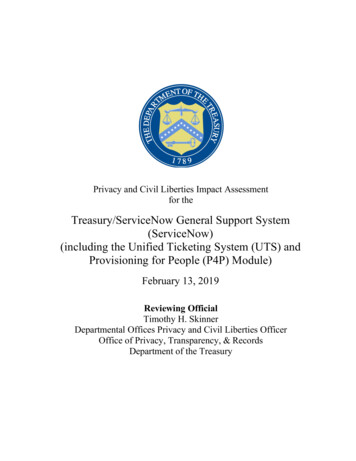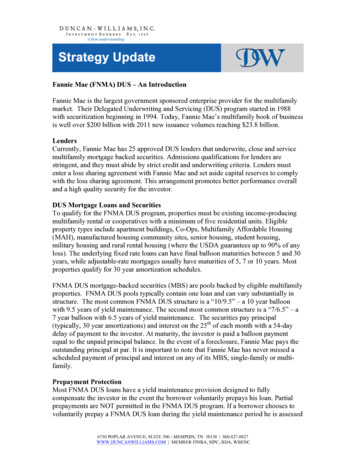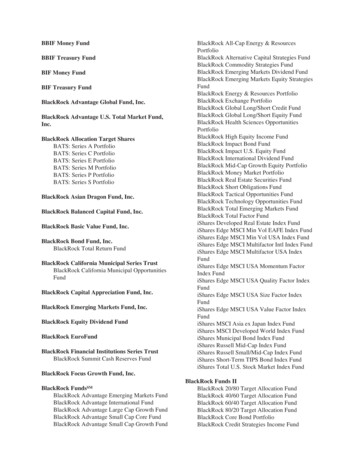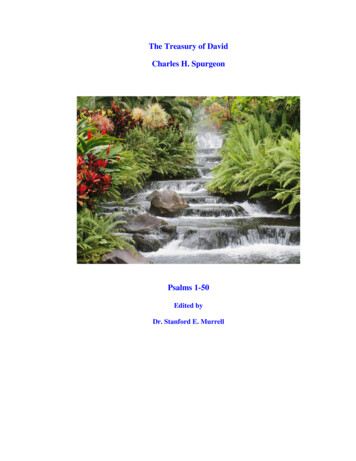
Transcription
The Treasury of DavidCharles H. SpurgeonPsalms 1-50Edited byDr. Stanford E. Murrell
PrefaceMy preface shall at least possess the virtue of brevity, as I find it difficult to impart to it anyother. The delightful study of the Psalms has yielded me boundless profit and ever-growingpleasure; common gratitude constrains me to communicate to others a portion of the benefit,with the prayer that it may induce them to search further for themselves.That I have nothing better of my own to offer upon this peerless book is to me matter of deepestregret; that I have anything whatever to present is subject for devout gratitude to the Lord ofgrace. I have done my best, but, conscious of many defects, I heartily wish I could have done farbetter.The Exposition here given is my own. I consulted a few authors before penning it, to aid me ininterpretation and arouse my thoughts; but, still I can claim originality for my comments, at leastso I honestly think. Whether they are better or worse for that, I know not; at least I know I havesought heavenly guidance while writing them, and therefore I look for a blessing on the printingof them.The collection of quotations was an after-thought. In fact, matter grew upon me which I thoughttoo good to throw away. It seemed to me that it might prove serviceable to others, if I reservedportions of my reading upon the various Psalms; those reserves soon acquired considerable bulk,so much so that even in this volume only specimens are given and not the bulk.One thing the reader will please clearly to understand, and I beg him to bear it in mind; I am farfrom endorsing all I have quoted. I am neither responsible for the scholarship or orthodoxy of thewriters. The names are given that each author may bear his own burden; and a variety of writershave been quoted that the thoughts of many minds might be before the reader. Still I trustnothing evil has been admitted; if it be so it is an oversight.The research expended on this volume would have occupied far too much of my time, had notmy friend and amanuensis Mr. John L. Keys, most diligently aided me in investigations at theBritish Museum, Dr. William's Library, and other treasuries of theological lore. With his help Ihave ransacked books by the hundred, often without finding a memorable line as a reward, but atother times with the most satisfactory result. Readers little know how great labour the finding ofbut one pertinent extract may involve; labour certainly I have not spared: my earnest prayer isthat some measure of good may come of it to my brethren in the ministry and to the church atlarge Should this first volume meet with the approbation of the judicious, I shall hope by God's graceto continue the work as rapidly as I can consistently with the research demanded and myincessant pastoral duties. Another volume will follow in all probability in twelve months' time, iflife be spared and strength be given.
It may be added, that although the comments were the work of my health, the rest of the volumeis the product of my sickness. When protracted illness and weakness laid me aside from dailypreaching, I resorted to my pen as an available means of doing good. I would have preached hadI been able, but as my Master denied me the privilege of thus serving him, I gladly availedmyself of the other method of bearing testimony for his name. O that he may give me fruit in thisfield also, and his shall be all the praise.Charles H. SpurgeonClapham, December, 1869.
PSALM 1TITLE. This Psalm may be regarded asTHE PREFACE PSALM, having in it a notification of the contents of the entire Book. It is thepsalmists's desire to teach us the way to blessedness, and to warn us of the sure destruction ofsinners. This, then, is the matter of the first Psalm, which may be looked upon, in some respects,as the text upon which the whole of the Psalms make up a divine sermon.DIVISION. This Psalm consists of two parts: in the first (from verse 1 to the end of the 3rd)David sets out wherein the felicity and blessedness of a godly man consisteth, what his exercisesare, and what blessings he shall receive from the Lord. In the second part (from verse 4 to theend) he contrasts the state and character of the ungodly, reveals the future, and describes, intelling language, his ultimate doom.Five Books of the PsalmsBookChapters 1 – 4142 – 7273 – 8990 – 106107 – 150FirstSecondThirdFourthFifthSeven Authors of the PsalmsWRITERNUMBER OF PSALMSCOMPOSEDDavid49; 84,85,87,8856Sons of Korah11Psalm 42, 44, 45, 46, 47, 48,Asaph12Psalm 50, 73, 74, 75, 76, 77, 78, 79, 80, 81,82,83Heman, the EzrahiteEthan, the EzrahiteMosesSolomonS.E.M.1111Psalm 88Psalm 89Psalm 90Psalm 721 Blessed is the man that walketh not in the counsel of the ungodly, nor standethin the way of sinners, nor sitteth in the seat of the scornful.
1: 1 Blessed. See how this Book of Psalms opens with a benediction, even as did the famousSermon of our Lord upon the Mount! The word translated "blessed" is a very expressive one.The original word is plural, and it is a controverted matter whether it is an adjective or asubstantive. Hence we may learn the multiplicity of the blessings which shall rest upon the manwhom God hath justified, and the perfection and greatness of the blessedness he shall enjoy. Wemight read it, "Oh, the blessednesses!" and we may well regard it (as Henry Ainsworth, d. 1622does) as a joyful acclamation of the gracious man's felicity. May the like benediction rest on us!Here the gracious man is described both negatively (verse 1) and positively (verse 2).He is a man who does not walk in the counsel of the ungodly. He takes wiser counsel, andwalks in the commandments of the Lord his God. To him the ways of piety are paths of peaceand pleasantness. His footsteps are ordered by the Word of God, and not by the cunning andwicked devices of carnal men. It is a rich sign of inward grace when the outward walk ischanged, and when ungodliness is put far from our actions.Note next, he standeth not in the way of sinners. His company is of a choicer sort than it was.Although a sinner himself, he is now a blood-washed sinner, quickened by the Holy Spirit, andrenewed in heart. Standing by the rich grace of God in the congregation of the righteous, hedares not herd with the multitude that do evil. Again it is said,"nor sitteth in the seat of the scornful."He finds no rest in the atheist's scoffings. Let others make a mock of sin, of eternity, of hell andheaven, and of the Eternal God; this man has learned better philosophy than that of the infidel,and has too much sense of God's presence to endure to hear His name blasphemed. The seat ofthe scorner may be very lofty, but it is very near to the gate of hell; let us flee from it, for it shallsoon be empty, and destruction shall swallow up the man who sits therein. Mark the gradation inthe first verse: He walketh not in the counsel of the ungodly. Nor standeth in the way of sinners, Nor sitteth in the seat of scornful.When men are living in sin they go from bad to worse. At first they merely walk in the counselof the careless and ungodly, who forget God—the evil is rather practical than habitual—but afterthat, they become habituated to evil, and they stand in the way of open sinners who willfullyviolate God's commandments; and if let alone, they go one step further, and become themselvespestilent teachers and tempters of others, and thus they sit in the seat of the scornful. They havetaken their degree in vice, and as true Doctors of Damnation they are installed, and are looked upto by others as Masters in Belial. But the blessed man, the man to whom all the blessings of Godbelong, can hold no communion with such characters as these. He keeps himself pure from theselepers; he puts away evil things from him as garments spotted by the flesh; he comes out fromamong the wicked, and goes without the camp, bearing the reproach of Christ. O for grace to bethus separate from sinners.
2 But his delight is in the law of the LORD; and in his law doth he meditate dayand night.1:2 And now mark his positive character. "His delight is in the law of the Lord." He is notunder the law as a curse and condemnation, but he is in it, and he delights to be in it as his rule oflife; he delights, moreover, to meditate in it, to read it by day, and think upon it by night. Hetakes a text and carries it with him all day long; and in the night-watches, when sleep forsakeshis eyelids, he museth upon the Word of God. In the day of his prosperity he sings psalms out ofthe Word of God, and in the night of his affliction he comforts himself with promises out of thesame book.The law of the Lord is the daily bread of the true believer. And yet, in David's day, how smallwas the volume of inspiration, for they had scarcely anything save the first five books of Moses!How much more, then, should we prize the whole written Word which it is our privilege to havein all our houses! But, alas, what ill treatment is given to this angel from heaven! We are not allBerean searchers of the Scriptures [Acts 17:10-13]. How few among us can lay claim to thebenediction of the text! Perhaps some of you can claim a sort of negative purity, because you donot walk in the way of the ungodly; but let me ask you—Is your delight in the law of God? Doyou study God's Word? Do you make it the man of your right hand—your best companion andhourly guide? If not, this blessing belongeth not to you.3 And he shall be like a tree planted by the rivers of water, that bringeth forth hisfruit in his season; his leaf also shall not wither; and whatsoever he doeth shallprosper.1:3 And he shall be like a tree planted—not a wild tree, but "a tree planted," chosen, consideredas property, cultivated and secured from the last terrible uprooting, for "every plant which myheavenly Father hath not planted, shall be rooted up:" Matthew 15:13.by the rivers of water; so that even if one river should fail, he hath another. The rivers of pardonand the rivers ofgrace, the rivers of the promise and the rivers of communion with Christ, are never failingsources of supply. He is "like a tree planted by the rivers of water,that bringeth forth his fruit in his season; not unseasonable graces, like untimely figs, whichare never full-flavored. But the man who delights in God's Word, being taught by it, bringethforth patience in the time of suffering, faith in the day of trial, and holy joy in the hour ofprosperity. Fruitfulness is an essential quality of a gracious man, and that fruitfulness should beseasonable.His leaf also shall not wither; his faintest word shall be everlasting; his little deeds of love shallbe had in remembrance. Not simply shall his fruit be preserved, but his leaf also. He shall neitherlose his beauty nor his fruitfulness.
And whatsoever he doeth shall prosper. Blessed is the man who hath such a promise as this. Butwe must not always estimate the fulfillment of a promise by our own eyesight. How often, mybrethren, if we judge by feeble sense, may we come to the mournful conclusion of Jacob, "Allthese things are against me!"For though we know our interest in the promise, yet we are so tried and troubled, that sight seesthe very reverse of what that promise foretells. But to the eye of faith this word is sure, and by itwe perceive that our works are prospered, even when everything seems to go against us. It is notoutward prosperity that the Christian most desires and values; it is soul prosperity that he longsfor. We often, like Jehoshaphat, make ships to go to Tarshish [in Spain] for gold, but they arebroken at Ezion-geber; but even here there is a true prospering, for it is often for the soul's healththat we would be poor, bereaved, and persecuted. Our worst things are often our best things. Asthere is a curse wrapped up in the wicked man's mercies, so there is a blessing concealed in therighteous man's crosses, losses, and sorrows. The trials of the saint are a divine husbandry, bywhich he grows and brings forth-abundant fruit.4 The ungodly are not so: but are like the chaff which the wind driveth away.1:4 We have now come to the second head of the Psalm. In this verse the contrast of the ill estateof the wicked is employed to heighten the coloring of that fair and pleasant picture whichprecedes it. The more forcible translation of the Vulgate and of the Septuagint version is—Not so the ungodly, not so. And we are hereby to understand that whatever good thing is said ofthe righteous is not true in the case of the ungodly. Oh! How terrible is it to have a doublenegative put upon the promises! And yet this is just the condition of the ungodly. Mark the use ofthe term "ungodly," for, as we have seen in the opening of the Psalm, these are the beginners inevil, and are the least offensive of sinners. Oh! If such is the sad state of those who quietlycontinue in their morality, and neglect their God, what must be the condition of open sinners andshameless infidels? The first sentence is a negative description of the ungodly, and the second isthe positive picture. Here is their character —they are like chaff, intrinsically worthless, dead, unserviceable, withoutsubstance, and easily carried away. Here, also, mark their doom, —the wind driveth away; death shall hurry them with its terrible blast into the fire in which theyshall be utterly consumed.5 Therefore the ungodly shall not stand in the judgment, nor sinners in thecongregation of the righteous.1:5 Therefore the ungodly shall not stand in the judgment. They shall stand there to be judged,but not to be acquitted. Fear shall lay hold upon them there; they shall not stand their ground;they shall flee away; they shall not stand in their own defense; for they shall blush and becovered with eternal contempt. Well may the saints long for heaven, for no evil men shall dwellthere,
nor sinners in the congregation of the righteous. All our congregations upon earth are mixed.Every Church hath one devil in it. The tares grow in the same furrows as the wheat. There is nofloor, which is as yet thoroughly purged from chaff. Sinners mix with saints, as dross mingleswith gold. God's precious diamonds still lie in the same field with pebbles. Righteous Lots arethis side heaven continually vexed by the men of Sodom.Let us rejoice then, that in "the general assembly and church of the firstborn" above, there shallby no means be admitted a single unrenewed soul. Sinners cannot live in heaven. They would beout of their element. Sooner could a fish live upon a tree than the wicked in Paradise. Heavenwould be an intolerable hell to an impenitent man, even if he could be allowed to enter; but sucha privilege shall never be granted to the man who perseveres in his iniquities. May God grant thatwe may have a name and a place in his courts above!6 For the LORD knoweth the way of the righteous: but the way of the ungodlyshall perish.1:6 For the LORD knoweth the way of the righteous. Or, as the Hebrew hath it yet more fully,"The Lord is knowing the way of the righteous." He is constantly looking on their way, andthough it may be often in mist and darkness, yet the Lord knoweth it. If it be in the clouds andtempest of affliction, he understandeth it. He numbereth the hairs of our head; he will not sufferany evil to befall us. "He knoweth the way that I take: when He hath tried me, I shall come forthas gold" (Job 23:10).But the way of the ungodly shall perish. Not only shall they perish themselves, but their wayshall perish too. The righteous carves his name upon the rock, but the wicked writes hisremembrance in the sand. The righteous man ploughs the furrows of earth, and sows a harvesthere, which shall never be fully reaped till he enters the enjoyments of eternity; but as for thewicked, he ploughs the sea, and though there may seem to be a shining trail behind his keel, yetthe waves shall pass over it, and the place that knew him shall know him no more for ever. Thevery "way" of the ungodly shall perish. If it exist in remembrance, it shall be in the remembranceof the bad; for the Lord will cause the name of the wicked to rot, to become a stench in thenostrils of the good, and to be only known to the wicked themselves by its putridity. May theLord cleanse our hearts and our ways that we may escape the doom of the ungodly, and enjoy theblessedness of the righteous!
PSALM 2TITLE. We shall not greatly err in our summary of this sublime Psalm if we call itTHE PSALM OF MESSIAH THE PRINCE; for it sets forth, as in a wondrous vision, the tumultof the people against the Lord's anointed, the determinate purpose of God to exalt his own Son,and the ultimate reign of that Son over all his enemies. Let us read it with the eye of faith,beholding, as in a glass, the final triumph of our Lord Jesus Christ over all his enemies. RobertLowth (1710-1787) has the following remarks upon this Psalm:"The establishment of David upon his throne, notwithstanding the opposition made to it by hisenemies, is the subject of the Psalm. David sustains in it a twofold character, literal andallegorical. If we read over the Psalm, first with an eye to the literal David, the meaning isobvious, and put beyond all dispute by the sacred history. There is indeed an uncommon glow inthe expression and sublimity in the figures, and the diction is now and then exaggerated, as itwere on purpose to intimate, and lead us to the contemplation of higher and more importantmatters concealed within. In compliance with this admonition, if we take another survey of thePsalm as relative to the person and concerns of the spiritual David, a noble series of eventsimmediately rises to view, and the meaning becomes more evident, as well as more exalted. Thecoloring which may perhaps seem too bold and glaring for the king of Israel, will no longerappear so when laid upon his great Antitype. After we have thus attentively considered thesubjects apart, let us look at them together, and we shall behold the full beauty and majesty ofthis most charming poem. We shall perceive the two senses very distinct from each other, yetconspiring in perfect harmony, and bearing a wonderful resemblance in every feature andlineament, while the analogy between them is so exactly preserved, that either may pass for theoriginal from whence the other was copied. New light is continually cast upon the phraseology,fresh weight and dignity are added to the sentiments, till, gradually ascending from things belowto things above, from human affairs to those that are Divine, they bear the great important themeupwards with them, and at length place it in the height and brightness of heaven."DIVISION. This Psalm will be best understood if it be viewed as a four-fold picture. (In verses1, 2, 3) the Nations are raging; (4 to 6) the Lord in heaven derides them; (7 to 9) the Sonproclaims the decree; and (from 10 to end) advice is given to the kings to yield obedience to theLord's anointed. This division is not only suggested by the sense, but is warranted by the poeticform of the Psalm, which naturally falls into four stanzas of three verses each.1 Why do the heathen rage, and the people imagine a vain thing?2:1 Why do the heathen rage, and the people imagine a vain thing? We have, in these firstthree verses, a description of the hatred of human nature against the Christ of God. No bettercomment is needed upon it than the apostolic song in Acts 4:27, 28: "For of a truth against thyholy child Jesus, whom thou hast anointed, both Herod, and Pontius Pilate, with the Gentiles,and the people of Israel, were gathered together, for to do whatsoever thy hand and thy counseldetermined before to be done." The Psalm begins abruptly with an angry interrogation; and wellit may: it is surely but little to be wondered at, that the sight of creatures in arms against theirGod should amaze the psalmist's mind.
We see the heathen raging, roaring like the sea, tossed to and fro with restless waves, as theocean in a storm; and then we mark the people in their hearts imagining a vain thing againstGod. Where there is much rage there is generally some folly, and in this case there is an excessof it.2 The kings of the earth set themselves, and the rulers take counsel together,against the LORD, and against his anointed, saying,2:2 Note, that the commotion is not caused by the people only, but their leaders foment therebellion.The kings of the earth set themselves. In determined malice they arrayed themselves inopposition against God. It was not temporary rage, but deep seated hate, for they set themselvesresolutely to withstand the Prince of Peace.And the rulers take counsel together. They go about their warfare craftily, not with foolishhaste, but deliberately. They use all the skill which art can give. Like Pharaoh, they cry, "Let usdeal wisely with them." O that men were half as careful in God's service to serve himwisely, as his enemies are to attack his kingdom craftily. Sinners have their wits about them, andyet saints are dull. But what say they? what is the meaning of this commotion?3 Let us break their bands asunder, and cast away their cords from us.2:3 Let us break their bands asunder. "Let us be free to commit all manner of abominations. Letus be our own gods. Let us rid ourselves of all restraint." Gathering impudence by the traitorousproposition of rebellion, they add -- let us cast away; as if it were an easy matter.let us fling off their cords from us. What! O ye kings, do ye think yourselves Samsons? and arethe bands of Omnipotence but as green withs before you? Do you dream that you shall snap topieces and destroy the mandates of God -- the decrees of the Most High -- as if they were buttow? and do ye say, "Let us cast away their cords from us?" Yes! There are monarchs who havespoken thus, and there are still rebels upon thrones. However mad the resolution to revolt fromGod, it is one in which man has persevered ever since his creation, and he continues in it to thisvery day. The glorious reign of Jesus in the latter day will not be consummated, until a terriblestruggle has convulsed the nations. His coming will be as a refiner's fire, and like fuller's soap,and the day thereof shall burn as an oven. Earth loves not her rightful monarch, but clings to theusurper's sway: the terribleconflicts of the last days will illustrate both the world's love of sin and Jehovah's power to givethe kingdom to his only Begotten. To a graceless neck the yoke of Christ is intolerable, but to thesaved sinner it is easy and light. We may judge ourselves by this, do we love that yoke, or do wewish to cast it from us?4 He that sitteth in the heavens shall laugh: the Lord shall have them in derision.
2:4 He that sitteth in the heavens shall laugh: the Lord shall have them in derision. Let usnow turn our eyes from the wicked counsel-chamber and raging tumult of man, to the secretplace of the majesty of the Most High. What doth God say? What will the King do unto the menwho reject his only-begotten Son, the Heir of all things? Mark the quiet dignity of theOmnipotent One, and the contempt which he pours upon the princes and their raging people. Hehas not taken the trouble to rise up and do battle with them—he despises them, he knows howabsurd, how irrational, how futile are their attempts against him—he therefore laughs at them.5 Then shall he speak unto them in his wrath, and vex them in his soredispleasure.2:5 Then shall he speak unto them in his wrath, and vex them in his sore displeasure. After hehas laughed he shall speak; he needs not smite; the breath of his lips is enough. At the momentwhen their power is at its height, and their fury most violent, then shall his Word go forth againstthem. And what is it that he says? – it is a very galling sentence – Yet, says he, "despite yourmalice, despite your tumultuous gatherings, despite the wisdom of your counsels, despite thecraft of your lawgivers, yet have I set my king upon my holy hill of Zion." Is not that a grandexclamation! He has already done that which the enemy seeks to prevent. While they areproposing, he has disposed the matter. Jehovah's will is done, and man's will frets and raves invain. God's Anointed is appointed, and shall not be disappointed. Look back through all the agesof infidelity, hearken to the high and hard things which men have spoken against the Most High,listen to the rolling thunder of earth's volleys against the Majesty of heaven, and then think thatGod is saying all the while, "Yet have I set my king upon my holy hill of Zion."6 Yet have I set my king upon my holy hill of Zion.2:6 Yet have I set my king upon my holy hill of Zion. Yet Jesus reigns, yet he sees the travail ofhis soul, and "his unsuffering kingdom yet shall come" when he shall take unto himself his greatpower, and reign from the river unto the ends of the earth. Even now he reigns in Zion, and ourglad lips sound forth the praises of the Prince of Peace. Greater conflicts may here be foretold,but we may be confident that victory will be given to our Lord and King. Glorioustriumphs are yet to come; hasten them, we pray thee, O Lord! It is Zion's glory and joy that herKing is in her, guarding her from foes, and filling her with good things. Jesus sits upon thethrone of grace, and the throne of power in the midst of his church. In him is Zion's bestsafeguard; let her citizens be glad in him."Thy walls are strength, and at thy gatesA guard of heavenly warriors waits;Nor shall thy deep foundations move,Fixed on his counsels and his love.Thy foes in vain designs engage;Against his throne in vain they rage,Like rising waves, with angry roar,That dash and die upon the shore."
7 I will declare the decree: the LORD hath said unto me, Thou art my Son; thisday have I begotten thee.2:7 This Psalm wears something of a dramatic form, for now another person is introduced asspeaking. We have looked into the council-chamber of the wicked, and to the throne of God, andnow we behold the Anointed declaring his rights of sovereignty, and warning the traitors of theirdoom. God has laughed at the counsel and ravings of the wicked, and now Christ the Anointedhimself comes forward, as the Risen Redeemer, "declared to be the Son of God with power,according to the spirit of holiness, by the resurrection from the dead." Romans 1: 4. Lookinginto the angry faces of the rebellious kings, the Anointed One seems to say, "If this sufficeth notto make you silent,I will declare the decree. Now this decree is directly in conflict with the device of man, for itstenor is the establishment of the very dominion against which the nations are raving.Thou art my Son. Here is a noble proof of the glorious Divinity of our Immanuel. "For untowhich of the angels said he at any time, Thou art my Son, this day have I begotten thee?" What amercy to have a Divine Redeemer in whom to rest our confidence!This day have I begotten thee. If this refers to the Godhead of our Lord, let us not attempt tofathom it, for it is a great truth, a truth reverently to be received, but not irreverently to bescanned. It may be added, that if this relates to the Begotten One in his human nature, we musthere also rejoice in the mystery, but not attempt to violate its sanctity by intrusive prying into thesecrets of the Eternal God. The things which are revealed are enough, without venturing intovain speculations. In attempting to define the Trinity, or unveil the essence of Divinity, manymen have lost themselves: here great ships have foundered. What have we to do in such a seawith our frail skiffs?8 Ask of me, and I shall give thee the heathen for thine inheritance, and theuttermost parts of the earth for thy possession.2:8 Ask of me. It was a custom among great kings, to give to favored ones whatever they mightask (Esther 5:6; Matthew 14:7.) So Jesus hath but to ask and have. Here he declares that his veryenemies are his inheritance. To their face he declares this decree, and"Lo! Here," cries the Anointed One, as he holds aloft in that once pierced hand the scepter of hispower, "He hath given me this, not only the right to be a king, but the power to conquer."9 Thou shalt break them with a rod of iron; thou shalt dash them in pieces like apotter's vessel.2:9 Thou shalt break them with a rod of iron. Yes! Jehovah hath given to his Anointed a rod ofiron with which he shall break rebellious nations in pieces, and, despite their imperial strength,they shall be but as potters' vessels, easily dashed into shivers, when the rod of ironis in the hand of the omnipotent Son of God.
thou shalt dash them in pieces like a potter's vessel. Those who will not bend must break.Potters' vessels are not to be restored if dashed in pieces, and the ruin of sinners will be hopelessif Jesus shall smite them."Ye sinners seek his grace,Whose wrath ye cannot bear;Fly to the shelter of his cross,And find salvation there."NoteThe word for "rod" is the same used in Psalms 23:4. The Eastern shepherds would use a club toprotect the sheep from wild animals. The thought is to act towards the nations as a shepherdwould act toward wild animals trying to harm the sheep. The Messiah, as the Good Shepherdwill protect His people progressively through time. Psalms 2:9 is quoted three times in the NewTestament: Revelation 2:27; 12:5; 19:15. S.E. M.10 Be wise now therefore, O ye kings: be instructed, ye judges of the earth.2:10 The scene again changes, and counsel is given to those who have taken counsel to rebel.They are exhorted to obey, and give the kiss of homage and affection to him whom they havehated.Be wise.—It is always wise to be willing to be instructed, especially when such instruction tendsto the salvation of the soul.Be wise now, therefore; delay no longer, but let good reason weigh with you. Your warfarecannot succeed, therefore desist and yield cheerfully to him who will make you bow if yourefuse his yoke. O how wise, how infinitely wise is obedience to Jesus, and
Charles H. Spurgeon Clapham, December, 1869. PSALM 1 TITLE. This Psalm may be regarded as THE PREFACE PSALM, having in it a notification of the contents of the entire Book. It is the . for they had scarcely anything save the first five books of Moses! How much more, then, should we prize
